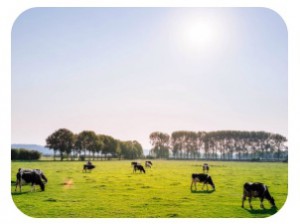 When people think of the organic food movement, their thoughts will often wander to images of upscale urban grocery stores and the fancy clientele that patronize them. But the early days of organic food production certainly wasn’t led by city slickers. In fact, more than 20 years ago a group of Amish farmers developed one of the nation’s first major organic agricultural operations. Centered around the small town of Kalona, Iowa, this collection of primarily dairy farmers has thrived on selling its USDA certified organic items to chains like Whole Foods.
When people think of the organic food movement, their thoughts will often wander to images of upscale urban grocery stores and the fancy clientele that patronize them. But the early days of organic food production certainly wasn’t led by city slickers. In fact, more than 20 years ago a group of Amish farmers developed one of the nation’s first major organic agricultural operations. Centered around the small town of Kalona, Iowa, this collection of primarily dairy farmers has thrived on selling its USDA certified organic items to chains like Whole Foods.
As the years went by, though, these small scale producers started to face increasing competition from large farming companies. For instance, from 2008 to 2015 the total amount of organic milk products made by the industry jumped 35 percent from 1.8 billion pounds to 2.4 billion pounds. This glut of supply has led to a 33 percent drop in the price of organic milk during this year alone. As a result, the Amish farmers in Kalona have been forced to sell nearly 15 percent of their inventory at the same price as regular milk. And if they can’t find a buyer, they simply dump it out on the ground.
This situation is even more frustrating for Kalona’s farming community since many suspect that their big competitors don’t produce genuine organic milk. A farm’s dairy cows must be grass-fed in order to receive USDA certification. But while this practice produces better quality milk, it also reduces the overall amount that a cow can produce. To get around this, some large farms graze their cows in grass for as short a time as possible before moving them back into feeding lots. And while the USDA occasionally cites farms for violating this procedure, it rarely punishes them. For instance, ten years ago the agency found “willful” violations of grazing rules at Aurora Organic Dairy, one of the country’s largest dairy producers. Then just a month ago an investigation by The Washington Post found that the company was continuing to fall short of organic standards. Still, in both cases the USDA declined to punish Aurora with fines.
So unless enforcement of organic standards improves, Kalona’s Amish community will continue to be at the mercy of the wider milk market. “Nobody’s real happy right now,” said James Swantz, a farmer who cares for about 70 cows in Kalona. “We’d like to know what our milk check will be, and right now we can’t tell.”
Questions:
- Should the USDA enforce stricter organic certification standards?
- How can Kalona’s community of Amish farmers compete against large scale producers?
